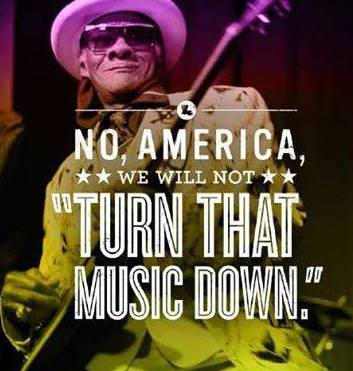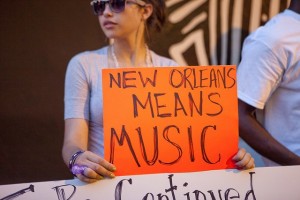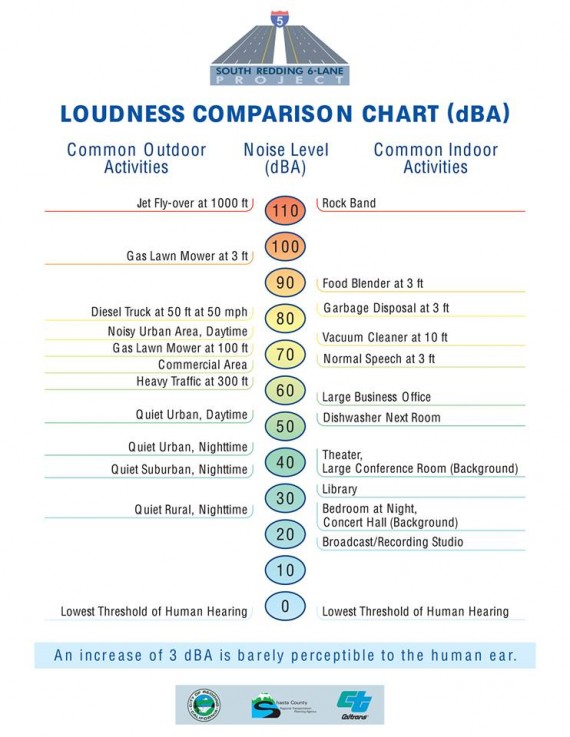Earlier today, the New Orleans City Council met in its main chambers at City Hall to hear several items on an agenda pertaining to citywide live music and entertainment permits, and the hot potato of the hour; the base draft for the new New Orleans noise ordinance. Though no final noise ordinance documents were voted into law today, the City Council did put ink to paper to make the document now commonly known as the “Seven Essentials Plan” the official outline City Hall will use as the base language for the crafting of the new city noise ordinance, which is reportedly scheduled to go to vote as early as next month.
For almost two years now, municipal permits for live music and noise ordinance citations have risen to the top of political banter and cultural community conversation. While this topic is not a new one, and is often misrepresented as only a “post-Katrina” issue (though certainly exacerbated by post-Katrina transitions), it is not until now that elected officials are actually accepting, reviewing and voting on revised or new policies governing musical expression either on public streets or in private clubs. Street artists of the 1960s and 1970s also faced opposition from large property owners and other interests in the city at times, as presented in historical documents by local law scholar Mary Howell at a Music and Culture Coalition of New Orleans (MACCNO) community meeting months ago. The difference now is that today’s media technology has allowed for increased awareness among more people about what is happening surrounding live music allowances. And word of any type of increased restriction or regulation on music and cultural practice in New Orleans will undoubtedly raise red flags.
However, based on the public turn-out at today’s City Council hearing, it seems that not enough red flags have been hoisted. All but a handful of local musicians and a few representatives of the MACCNO group were present, representation of the View Carré Property Owners and Residents Association (VCPORA) visibly more numerous than any other one group in the mostly empty council chamber. [Video from a MACCNO member here.] After a long hour of hearing shorter agenda items (including the withdrawal of the new Habana Outpost’s application for a live music permit, after which the VCPORA members left), finally a reading of the “Seven Essentials Plan” was conducted. [Another video from a MACCNO member here.] All City Council members then agreed, via signature, to use this document as the base for the updated New Orleans noise ordinance they plan to finalize and vote on in January.
The “Seven Essentials Plan” is controversial for several reasons. One is that its skeleton was composed and presented to City Hall by the VCPORA group and their representing attorney, Stuart Smith. This is the group that rallied against live music outdoors in the French Quarter and periphery over recent years in multiple ways. Secondly, it maintains the current city noise ordinance (which is decades old) mandate that noise ordinance violations in the City of New Orleans are a criminal, versus civil, offense, and therefore criminalizes musicians who receive a noise violation citation. Third, this plan sets the legal limit for public music at 60 decibels, a sonic meter reading equivalent to that of an unamplified human conversation (see decibel chart below) . This means that police officers can issue criminal tickets to musicians for performing at any volume level over 60 decibels in any public space, or if responding to a complaint, even inside a venue. You can view a copy of the “Seven Essentials Plan” here.
It is unclear as to why the City Council has chosen to use this document as the foundation for the noise ordinance in a city that relies heavily on music, dance and related culture for its booming tourism industry. However, it is also unclear if any other comprehensive documents were submitted by any other business, neighborhood or interest groups by the deadline to also be considered for use. Council woman Kristin Gisleson-Palmer, whose district contains perhaps the most live music locales in the city, did issue a statement of opinion on the matter shortly after the City Council hearing today. The statement is posted in its entirety below.
***
Over the last day, I have heard from many residents who have expressed concern about a sound ordinance that was introduced at today’s City Council meeting.
I want to be clear that, despite what you may have heard, the City Council did not vote on an ordinance dealing with sound at today’s meeting. Characterizations of the Council sneaking a law through during the holidays or orchestrating backroom deals are, in a word, false.
Rather, a proposal was introduced today in an attempt to offer a starting point for public consideration and discussion. The ordinance that was introduced today did not originate from my office, but I signed on to it because I support its intention: to carry on an important dialog and get us closer to a sound ordinance that is fair and objective.
As a Councilmember, I am deeply committed to following the proper legislative process, which includes numerous opportunities for public input and discussion. The proposal that was introduced today will be the subject of a public committee meeting, and if it comes before the Council for a vote, there will be an opportunity for public input at that time. Additionally, my staff and I will work—as we have thus far—with representatives from all segments of the community, including neighbors, businesses, musicians, sound experts, cultural groups, and others.
I support the “Seven Essential Items to Make New Orleans’ Noise Ordinance Fair and Functional,” which has received widespread support from all sections of the community and is significantly based on the Woolworth report that I commissioned. I have also been pleased by the work of community groups up to this point, including the Music and Culture Coalition of New Orleans, in reaching points of agreement among various communities. It is my desire and expectation that we will continue to work together to develop this proposal so that it is agreeable to the broad and diverse New Orleans community.
I am committed to protecting our vibrant and unique musical culture. I am also committed to protecting residents and visitors against unsafe sound levels and improving the city’s quality of life. These goals are not mutually exclusive, and I hope residents will continue to participate in the public conversation as we move forward.
***
One key contradiction in the above statement claims that the “Seven Essential Items” plan has “received widespread support from all sections of the community and is significantly based on the Woolworth report that I commissioned.” In fact, the “Seven Essentials” proposal was presented by the VCPORA in June of 2013 and David Woolworth’s analysis of the present New Orleans noise ordinance and the city’s physical soundscape itself for the commissioned Oxford Acoustics firm was completed and released in August of 2013. This chronology of events would make it impossible for the “Seven Essentials” plan to be based on the later-issued report. The Woolworth report also makes the recommendation that New Orleans’ noise ordinance be revised to change noise ordinance violations from criminal to civil. (View the Woolworth report in its entirety here.)
Resident vs. Musician? Or Resident vs. Resident?
One of the most troubling threads throughout what has become a battle between a select group of property owners and a broader group of musicians and small business owners is the “resident versus musician” narrative. Nearly every legal document, opinion and news or blog article that has been posted contains such rhetoric. The reality is that the contenders in this issue at the podium of City Hall are all residents. This topic is very much a “resident versus resident” issue, but somehow the paper trail has found a way to label musicians in New Orleans as something other than residents.
What About Industrial Noise?
The other big question surrounding the city noise ordinance is where industrial noise falls into legal regulation. Of all the talk of music in New Orleans creating “noise” that disturbs some residents’ “quality of life,” the consequences for construction companies, trucking companies, oil companies, shipping companies or any other business that generates loud, chronic noise prone to affect one’s “quality of life” does not seem to appear in the base language of this noise ordinance drafting. So far, music is the only form of “noise” that is appearing before City Council. Will construction company owners be subject to the same fines and criminal infractions as horn players in the French Quarter, should their work exceed 60 decibels, or whatever decibel limit the final noise ordinance may permit? Could it be possible that the noise ordinance issue is more about clashes in lifestyle and music genre preferences between neighbors than it is an actual noise pollution issue?

New Orleans' tourism bureau places ads like this, while City Hall signs 60 decibels as noise ordinance "starting point." (Pictured: Little Freddie King)
Regardless of these intricacies, the circumstance now is that a template document has been selected by the City Council to serve as the basis for what will become the new New Orleans noise ordinance, which will affect every musician and live music venue in the city, once it is signed into law. This does not mean that the “Seven Essentials” plan is guaranteed to make it into the law books as-is, but if residents wish to have a voice in how this document is edited before it is made law, there is a very short time window in which to make this happen. If one thing is clear, it is that not nearly enough musicians and music community professionals are actively participating in this process.
City Council is scheduled to meet next on Thursday, January 9, 2014. The noise ordinance issue is slated to be an agenda item for this hearing date, though there is always the chance that other more pertinent agenda items may fill the meeting time and it may get delayed again. Either way, those that wish to participate in the shaping of the noise ordinance would need to call or write their council person before January 9.
The MACCNO musicians advocacy group has also created an online petition requesting the City Council allow for further facilitation of broader public opinion on the new noise ordinance, rather than only considering the VCPORA “Seven Essentials” proposed plan — before it votes on a final revised noise ordinance. If interested, you can sign the petition here. The roster of council persons and their contact information by district is also available on the MACCNO website. Attending the next City Council meeting to ask questions or voice opinions is also an option.
UPDATE: Friday, December 20, 2013
The MACCNO group today posted the collective’s official statement in response to the City Council’s December 19 decision and Council woman Gisleson-Palmer’s personal statement. View MACCNO’s statement on their website here.
UPCOMING OPEN COMMUNITY ACTIVISM EVENTS:
Friday, January 3: MACCNO Open Forum and Strategy Session (all are welcome)
4 p.m. – 6 p.m.
@ Room #210 (2nd Floor) inside the New Orleans Healing Center (2372 St. Claude Ave)
Thursday, January 9: Next City Council Hearing (open to all New Orleans residents)
10 a.m. – 12 p.m.
@ City Council Chamber inside New Orleans City Hall (1300 Perdido St)
Friday, January 17: Special Committee Hearing on the New Orleans Sound Ordinance with City Council
11 a.m. – 1 p.m.
@ City Council Chamber inside New Orleans City Hall (1300 Perdido St)
Plus: Music and Culture Coalition Rally and Demonstration – gathers on plaza at 11 a.m.







